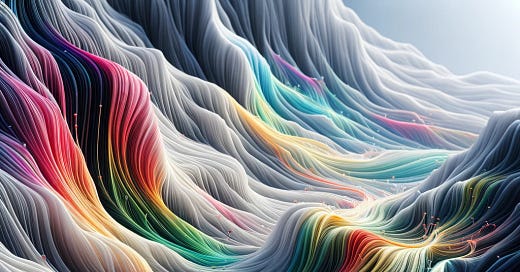Don’t Watch Where You're Going
Showering, exercising, pissing, and wandering around the house in the dark
I’m a generally visual guy: I drive a car, play video games, and watch movies. I also enjoy what happens when I put aside the faculty of vision for a while and discover how that changes experience.
Most evenings, I enjoy turning off the bathroom lights, shutting the bathroom door to close out external light, and taking a shower in the dark. In a small space, you can become familiar with the counters, sinks, and other aspects of the room, and become confident moving around the room without the aid of vision.
I’ve probably showered in the dark more evenings than not for more than a decade. In my youth, I took showers in the morning, and used showers to wake up for the day. The implicit goal was to be fresh for public presentation. Then I married a woman who took evening showers, and I converted to that. The implicit idea was to not carry any of the grime of the day into bed. Two different vibes.
Showering in the dark in the evening is a womb-like relaxation before bed. The primary sensation is the hot water running over me, undiluted by the visual experience of a shower stall. It is a very peaceable experience.
As the night continues, I remain in dark. I use industrial-strength eyeshades at night, and occasionally, I need to take a piss in the middle of the night. I used to lift my eyeshade to make my way to the toilet. Now, I have memorized the spatiality of the hall, and can easily make my way to the toilet and back with my eyeshades on, vision-free. I am not confident enough, however, to take a piss standing up without vision, so I do take the step, thought unmanly by some, of sitting down when I piss at night.
I find remaining without vision minimizes the possibility of thought arising if I should go to the bathroom in the middle of the night. It is often a completely thoughtless experience, maintaining partial immersion in the sense of sleep, in contrast to my experience when I allowed activation of the visual field.
Occasionally, I exercise in the dark. This has the benefit of challenging balance (the visual sense has a large role in maintaining balance) and allows me to focus on the sensation of movement, making the proprioceptive alignment prominent. Sometimes, weightlifting in the dark feels like a concentrative meditation, allowing undiluted immersion in the experience of pure effort.
A few times a year, my daughter and I both enjoy spending some time in the house with eyeshades (effectively, a blindfold) on. We know the layout of things, but to interact with objects without vision creates a different kind of knowledge than visual knowledge, a confidence in spatiality.
Finally, closing my eyes while practicing piano ensures development of confidence in the sheer physicality necessary for improvisation.
Vision is a wonderful sense, one of my favorites! Its power, however, to dominate sensory experience, and in particular its power to calculate about the spatial location, weight and texture of objects, can lead to loss of contact with other senses, in particular the kinesthetic and touch.
Occasionally turning off vision while continuing to be active in aspects of waking, moving life can open up a deeper relationship with spatiality.



